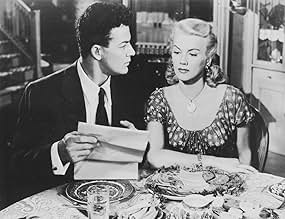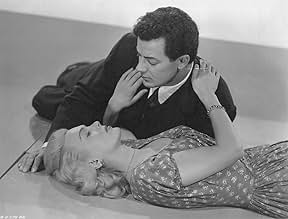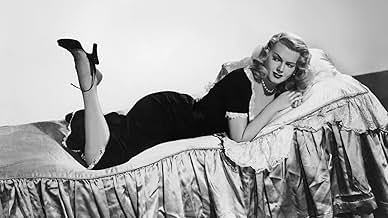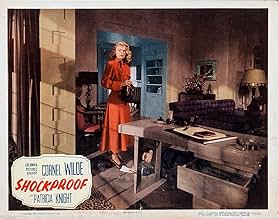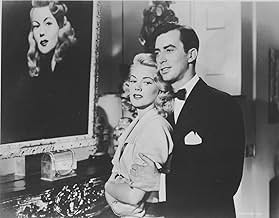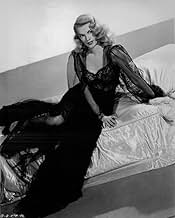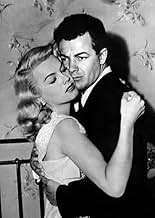IMDb-BEWERTUNG
6,5/10
2722
IHRE BEWERTUNG
Füge eine Handlung in deiner Sprache hinzuA parole officer falls in love with his client, a ravishing blonde who served time for murder, and he's determined to help her go straight despite her interfering criminal boyfriend.A parole officer falls in love with his client, a ravishing blonde who served time for murder, and he's determined to help her go straight despite her interfering criminal boyfriend.A parole officer falls in love with his client, a ravishing blonde who served time for murder, and he's determined to help her go straight despite her interfering criminal boyfriend.
- Regie
- Drehbuch
- Hauptbesetzung
Shirley Adams
- Emmy
- (Nicht genannt)
Gilbert Barnett
- Barry
- (Nicht genannt)
Richard Benedict
- 'Kid' - Knife Wielder
- (Nicht genannt)
Paul Bradley
- Airline Clerk
- (Nicht genannt)
Argentina Brunetti
- Stella
- (Nicht genannt)
Paul Bryar
- Man in Car
- (Nicht genannt)
John Butler
- Sam Green, Pawnbroker
- (Nicht genannt)
Claire Carleton
- Florrie Kobiski
- (Nicht genannt)
Cliff Clark
- Mac - Police Lieutenant
- (Nicht genannt)
King Donovan
- Joe Wilson
- (Nicht genannt)
Al Eben
- Joe Kobiski
- (Nicht genannt)
Empfohlene Bewertungen
Patricia Knight has just been paroled. Her parole officer is Cornell Wilde. He reads off the list of restrictions which she has already memorized. She almost immediately breaks them when she sees her former lover, gambler John Baragrey in a bookie shop, but Wilde gives her another chance. She loses her job, so her takes her into his home to take care of his blind mother. Soon they are in love. She goes to Baragrey's apartment to tell him goodbye. He calls Wilde at the office to tell him she's breaking parole and playing him for a sucker, so she shoots him. And she and Wilde go on the run.
Douglas Sirk directs with lots of fine location shooting, including the essential-for-noir Bradbury Building. He agreed to shoot this one after reading Samuel Fuller's original story, even though Columbia put in a cop-out ending that frustrated Wilde's character arc, from a straight-arrow fellow with political ambition to a criminal on the run. His real-life wife, Patricia Knight, gives a fine, guarded performance; you never know what she's really thinking or going to do next. Her movie career did not survive her divorce from Wilde. She died in 2004, age 89.
Douglas Sirk directs with lots of fine location shooting, including the essential-for-noir Bradbury Building. He agreed to shoot this one after reading Samuel Fuller's original story, even though Columbia put in a cop-out ending that frustrated Wilde's character arc, from a straight-arrow fellow with political ambition to a criminal on the run. His real-life wife, Patricia Knight, gives a fine, guarded performance; you never know what she's really thinking or going to do next. Her movie career did not survive her divorce from Wilde. She died in 2004, age 89.
Real life husband and wife Cornel Wilde and Patricia Knight star as parole officer / parolee in this quasi noirish post-war drama. Wilde, who is assigned as Knight's parole officer, insists that as a condition of her parole she no longer associate with her former boyfriend, unsavory gambler (John Baragrey). Wilde who is smitten almost immediately by Knight, begins to bend the rules as Knight ignores the conditions of her parole and continues to see Baragrey. Because of her parole violations, Wilde being a concerned officer of the court, suggests Knight move into his home that he shares with his blind, widowed mother and younger brother. The situation continues on a downward trend.
Written by hard edged, cigar chomping, World War II vet Samuel Fuller and directed by melodrama master Douglas Sirk, this movie is a contrast of styles between writer and director. In this case the director Sirk called the shots. With the assist of a script revision from Helen Deutsch (I'll Cry Tomorrow, Valley of the Dolls), Sirk plays it out more as a tortured romantic triangle with dribs and drabs of writer Fuller's permeating cynicism occasionally popping through.
Despite a title suggesting more lurid content, 'Shockproof' offers little to actually be shocked by, probably because of the lack of any real criminal intent by the characters beyond parole violations. What tension this movie engenders is more human conflict from the soap opera style re-draft by Deutsch. With a script basically hollowed from Fuller's fatalistic influence, what's left is a sort of a well-crafted but tepid potboiler complete with a contrived populist ending.
'Shockproof' isn't a bad movie just more of a disappointment of what could have been.
Written by hard edged, cigar chomping, World War II vet Samuel Fuller and directed by melodrama master Douglas Sirk, this movie is a contrast of styles between writer and director. In this case the director Sirk called the shots. With the assist of a script revision from Helen Deutsch (I'll Cry Tomorrow, Valley of the Dolls), Sirk plays it out more as a tortured romantic triangle with dribs and drabs of writer Fuller's permeating cynicism occasionally popping through.
Despite a title suggesting more lurid content, 'Shockproof' offers little to actually be shocked by, probably because of the lack of any real criminal intent by the characters beyond parole violations. What tension this movie engenders is more human conflict from the soap opera style re-draft by Deutsch. With a script basically hollowed from Fuller's fatalistic influence, what's left is a sort of a well-crafted but tepid potboiler complete with a contrived populist ending.
'Shockproof' isn't a bad movie just more of a disappointment of what could have been.
It's difficult to believe, but even by this Early Date of 1949 the Cynicism and Doom Laden Tropes of Film-Noir were becoming unacceptable for the Safe and Conservative Studio Heads. Sam Fuller's Script was stripped of its edginess and coated with a sweetness Ending. Neither Fuller nor Director Douglas Sirk were pleased and voiced Their disapproval loudly.
But the Power of Low-Rung, untested Writers and Directors was Minimal. So what remains is a Soapy Triangle with enough Artistic Insight to be passable and somewhat enjoyable, but hardly Pure Film-Noir and the impact is diluted and disappointing.
Cornel Wilde as the Parole Officer and Patricia Knight have and unexpected collision of Love's vice like grip and its ability to change People drastically. John Barangay as the Ex-Lover is Bland and really doesn't do much to attract audiences to His vile villainy but is good enough.
Wilde, not the best Actor in the World does have a Physical Presence and was Drop Dead Handsome. Knight was as Stiff as They Come and had a limited Career and tries mightily here but was betrayed by Her Talent and got by on Her slightly Off-Beat Beauty.
Overall, Worth a Watch for Sirk and Fuller, but must be Footnoted as mishandled by Studio Interference. Film-Noir Fans and Fuller Cultists might be disappointed. A Film-Noir only in a Wide Definition of the Genre.
But the Power of Low-Rung, untested Writers and Directors was Minimal. So what remains is a Soapy Triangle with enough Artistic Insight to be passable and somewhat enjoyable, but hardly Pure Film-Noir and the impact is diluted and disappointing.
Cornel Wilde as the Parole Officer and Patricia Knight have and unexpected collision of Love's vice like grip and its ability to change People drastically. John Barangay as the Ex-Lover is Bland and really doesn't do much to attract audiences to His vile villainy but is good enough.
Wilde, not the best Actor in the World does have a Physical Presence and was Drop Dead Handsome. Knight was as Stiff as They Come and had a limited Career and tries mightily here but was betrayed by Her Talent and got by on Her slightly Off-Beat Beauty.
Overall, Worth a Watch for Sirk and Fuller, but must be Footnoted as mishandled by Studio Interference. Film-Noir Fans and Fuller Cultists might be disappointed. A Film-Noir only in a Wide Definition of the Genre.
Enjoyed this film a great deal because I always liked Cornel Wilde, (Griff Marat) who plays the role as a parole officer and he has to deal with a very attractive gal named Jenny Marsh, (Patricia Knight) who spent five years in prison for taking the rap for murder which she did for her lover Harry Wesson, (John Baragrey). Griff tells Jenny she cannot have anything to do with her boyfriend Harry and he also put many restrictions on her because she is on parole for life. Griff begins to take a liking to Jenny but she fights him off and wants to always go back to her lover. This story takes on many twists and turns which holds your interest and I was very surprised that the hairstyle and clothes that Patricia Knight wore would even look great today, she gave a great performance.
A parole officer falls for one of his charges, but is she playing him for a sucker? Not so much a noir as a noir-esque romantic melodrama, and not up to the level of the best from either director Douglas Sirk or writer Sam Fuller. The story could have gone one of two ways, and it chose the less interesting path (from what I've read, this might have been a studio decision). However, Cornel Wilde and Patricia Knight (actual spouses at the time) handle their performances quite well, and play off each other with conviction and chemistry. The script has some nice touches, the photography is pretty sharp, and the supporting roles are good. It's certainly a watchable movie, just rather bland... and it wraps up far too easily.
Wusstest du schon
- WissenswertesThis film features the iconic Bradbury Building at 304 S. Broadway as the location of Griff Marat's office. Out of his office window can be seen the old Hall of Records Building at 220 N. Broadway (demolished 1973), which is about 0.4 miles away.
- PatzerWhen Sam Brooks comes into Griff's office, he leaves the door open. After he reads the folder and leaves the door is closed without him ever closing it.
- Zitate
Jenny Marsh: I'm no longer asking you to say goodbye. I'm just saying it!
- Crazy CreditsFollowing the opening credits the camera pans onto the curb edge of the road which reads HOLLYWOOD BLVD.
- VerbindungenFeatured in Behind the Mirror: A Profile of Douglas Sirk (1979)
Top-Auswahl
Melde dich zum Bewerten an und greife auf die Watchlist für personalisierte Empfehlungen zu.
- How long is Shockproof?Powered by Alexa
Details
- Erscheinungsdatum
- Herkunftsland
- Sprachen
- Auch bekannt als
- Los amantes
- Drehorte
- Produktionsfirma
- Weitere beteiligte Unternehmen bei IMDbPro anzeigen
- Laufzeit
- 1 Std. 20 Min.(80 min)
- Farbe
- Seitenverhältnis
- 1.37 : 1
Zu dieser Seite beitragen
Bearbeitung vorschlagen oder fehlenden Inhalt hinzufügen

